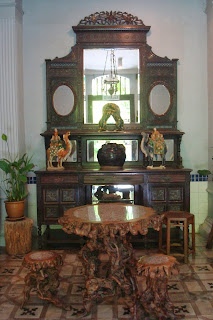God as tatay ...16th week Tuesday 2 2013
In
the eighth article of the faith we profess our faith, saying, I believe in the
Holy Spirit. We believe in the third
person of the Blessed Trinity. We
believe in the Spirit or the breadth of God, the giver of life, the advocate,
the helper, the comforter. The Spirit
goes with so many names, in so many descriptions. The Spirit cannot be seen but he makes his
presence known by the gifts he bestows on us and by the fruits of his presence
in us. There are seven gifts of the
Spirit and there are 9 fruits of the Holy Spirit in our lives. It might be good to dwell and reflect on each
of these in the future. But for purposes
of our reflection today I would like to cite just one proof that the Spirit
dwells in us. St. Paul says that it is
the Spirit dwelling in us that makes us cry out “Abba,” which means “father.” Abba is an Aramaic word for Father but used
only as a term of endearment. In other
words it is not the formal, the reserved, the prim and proper term “father” or
in Hiligaynon Amay but an endearing name like papa, tay. And only a person conscious of his deep and
endearing relationship can call someone or for that matter, God as “abba.” For St. Paul it is through the presence of
the Spirit that we call God abba. Only
the presence of the Spirit in us creates a deep relationship with God. God becomes real. God becomes father. God becomes papa, tatay.
Our First reading talks about the Exodus. The experience of Israel at the time of the
exodus, when they journeyed from Egypt to the land of promise, has always been
used as an image of our own journey to God.
Our first reading for example is required reading for the vigil of Easter, for the crossing of the Red Sea is an image of baptism. To cross from the slavery of sin to the land
of freedom we have to cross the water, meaning we have to be baptized. The crossing is an image of our baptism.
The trials too that they had to endure in the desert,
the dependence and trust in God that was formed and developed in the insecurity
of the desert speak also of our own journey.
That is why we call our own spiritual experience, our journey to God as
an exodus experience. It is in this
experience that we were cleansed, we were tried, we were made to rely on
providence, we were stripped naked of our pride; it is in this experience that
our weaknesses became too glaring to deny, it is in this experience that we
learned to surrender. Amo ni ang
gintawag ni John of the cross as the dark night. The exodus experience is a necessary
experience for it is in the desert that we form a relationship with God. We could not understand the gospel today if
we did not walk our own exodus, if we have not come to experience God in a
relationship – as a mother, as a sister, as a brother, as a tatay, as papa, as
a real daddy and mommy.
People nowadays think of religion as an affiliation to
some organization. Again we are reminded
in the gospel that religion is not an organization we affiliate ourselves to,
it is not a set of creed we adhere to, but it is a relationship because at some
point in my life God walked with me, God was a pillar of cloud during the day
and a pillar of fire during the night.
God walked with me, God is so real to me. Can you say that? God is so real to me. can you say that? Because this is the difference that marks a
true believer. And this is so because of the Spirit dwelling in you – the
eighth article – I believe in the Holy Spirit.

Comments